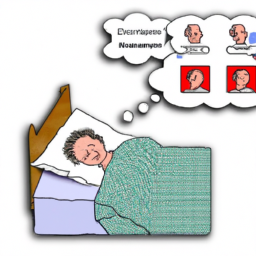I used to have extremely vivid dreams filled with excitement and adventure. Lately, it seems like they have completely disappeared. I can’t remember the last time I had a dream, and it’s starting to worry me.
I’ve always found dreams fascinating, and I miss the feeling of waking up and trying to piece together what happened in my mind while I slept. So, why did I stop having dreams?
As it turns out, there are several possible reasons why someone might stop dreaming. It could be related to their sleep habits, stress levels, or even medication they’re taking.
As someone who values the importance of a good night’s sleep, I decided to do some digging into the science of dreaming and explore some techniques to encourage dreaming. In this article, I’ll share what I’ve learned and hopefully help others who are experiencing a similar lack of dreams.
Key Takeaways
- Factors such as medications, stress, sleep apnea, and age can affect the frequency and intensity of dreams.
- Techniques such as keeping a dream journal, practicing relaxation techniques, and adjusting sleep schedule can encourage dreaming.
- Dream-enhancing foods and supplements like honey and melatonin can also help.
- Seeking professional help from sleep specialists, therapists, counselors, and medical professionals can identify and treat underlying sleep disorders or psychological issues affecting dreaming.
Understanding the Science of Dreaming
Dreams are like a mysterious movie that plays out in your mind while you sleep, but have you ever wondered why you stopped experiencing them? As it turns out, scientists have been studying dreams for decades, and they’ve discovered a lot about this fascinating phenomenon.
For starters, dreaming occurs during the Rapid Eye Movement (REM) phase of sleep when the brain is highly active, and the body is essentially paralyzed. During this time, the brain processes memories, emotions, and thoughts, which results in the creation of vivid and often bizarre dreamscapes.
Despite the fact that dreaming is a common and natural occurrence, it remains shrouded in mystery. Scientists still don’t fully understand why we dream or what purpose it serves. However, they do know that dreaming is essential for our mental and emotional well-being. Without it, we’re more likely to experience mood swings, anxiety, and depression.
So, if you’re not dreaming as much as you used to, it could be a sign that something is amiss with your mental health. Let’s explore some possible causes of not dreaming.
Possible Causes of Not Dreaming
You must be living the most exciting life if your mind can’t even be bothered to create a dream. But if, like me, you’ve stopped having dreams, it could be due to a variety of reasons. Here are some possible causes of not dreaming:
-
Medications: Certain medications, such as antidepressants, can decrease the frequency and intensity of dreams.
-
Stress: High levels of stress can make it difficult for the brain to enter into the deep sleep phase where dreams occur.
-
Sleep apnea: People with sleep apnea often have disrupted sleep, which can affect their ability to dream.
-
Age: As we age, our brain’s ability to enter into the deep sleep phase decreases, leading to less vivid dreams.
It can be frustrating to go through a period of time without dreaming. However, there are techniques to encourage dreaming, such as keeping a dream journal or practicing relaxation techniques before bed.
Techniques to Encourage Dreaming
If you’re looking to have more vivid dreams, there are a few techniques that can help. One of the most effective ways is to keep a dream journal beside your bed and write down any dreams you remember as soon as you wake up. This helps to train your mind to remember your dreams and can even help you identify common themes or patterns.
Additionally, try to incorporate relaxation techniques such as meditation or deep breathing before bed to calm your mind and increase your chances of having vivid dreams.
Another technique that can encourage dreaming is to adjust your sleep schedule so that you’re consistently getting enough sleep each night. Aim for 7-8 hours of sleep per night and try to go to bed and wake up at the same time each day. This can help regulate your sleep cycle and increase the amount of time you spend in REM sleep, which is when most dreaming occurs.
By incorporating these techniques, you can increase the likelihood of having vivid dreams and exploring your subconscious mind. And if you’re looking for even more ways to enhance your dream experience, consider incorporating dream-enhancing foods and supplements into your routine.
Incorporating Dream-Enhancing Foods and Supplements
To boost my chances of experiencing more vivid dreams, I’ve started incorporating dream-enhancing foods and supplements into my diet. For example, I’ve been adding a spoonful of honey to my nightly routine to sweeten my subconscious mind and unlock a world of imaginative possibilities.
I’ve also been taking melatonin supplements, which have been shown to increase dream activity and vividness. While these methods have been helpful, I know that they may not work for everyone.
If you’re still struggling to have vivid dreams, it may be time to seek professional help.
Seeking Professional Help
When I realized that I’d stopped having dreams, I decided to seek professional help. There are different types of professionals who specialize in sleep and mental health, such as sleep specialists, therapists, counselors, and medical professionals. Depending on the cause of my lack of dreams, I may need to consult with these professionals to identify and treat any underlying sleep disorders or psychological issues.
Sleep Specialists
Although there are many possible reasons why I stopped having dreams, consulting with a sleep specialist might shed light on the issue. These professionals specialize in sleep disorders and can conduct tests to determine if there’s an underlying medical condition that’s affecting my ability to dream. They can also provide recommendations on how to improve my sleep quality, such as adjusting my sleep schedule or creating a more conducive sleep environment.
If a sleep specialist determines that there’s no underlying medical condition, they may refer me to a therapist or counselor who can help me explore any psychological factors that may be contributing to my lack of dreams. This can include stress, anxiety, or depression, all of which can affect the quality and frequency of dreams.
By working with a therapist, I can address any underlying issues and develop strategies to promote more restful sleep and potentially regain my ability to dream.
Therapists and Counselors
After consulting with sleep specialists, I realized that my lack of dreaming may not be entirely related to my sleep patterns. While they did provide some helpful tips, I also decided to seek the advice of therapists and counselors to explore any underlying emotional or psychological factors.
Through therapy sessions, I discovered that I had been suppressing my emotions and thoughts in my waking life, which was carrying over into my dream state. With the help of my therapist, I learned techniques to better express and process my feelings, allowing for a more fulfilling and active dream life.
As I continued to work through these issues with my therapist, I also learned about the role of medical professionals in identifying and treating sleep disorders.
Medical Professionals and Sleep Disorders
To better understand the role of medical professionals in treating sleep disorders, you should think of them as the mechanics of your body, ensuring that every part is working together smoothly and efficiently, just like a well-tuned engine.
They are equipped with the knowledge and tools to diagnose and treat various sleep disorders, including insomnia, sleep apnea, and narcolepsy.
One of the main tools that medical professionals use to diagnose sleep disorders is a sleep study. During a sleep study, you are monitored overnight while you sleep, and the medical professional analyzes your brain activity, breathing patterns, and other vital signs.
Based on the results of the sleep study, they can determine the underlying cause of your sleep disorder and develop a treatment plan that is tailored to your specific needs.
Treatment options may include lifestyle changes, medication, or even surgery.
Overall, medical professionals play a crucial role in helping individuals with sleep disorders achieve better quality sleep and improve their overall health and well-being.
Frequently Asked Questions
Can not dreaming be a sign of a more serious health issue?
Not dreaming can be a symptom of certain health conditions such as sleep apnea or narcolepsy. It can also be a side effect of certain medications. It’s important to speak with a healthcare provider if this persists.
Is there a connection between not dreaming and medication usage?
My medication may be affecting my dreams. I’ve noticed a decrease in dream recall since starting it. Sometimes it feels like I’m in a haze, disconnected from my subconscious. It’s frustrating, but I’m grateful for the benefits the medication provides.
How long does it typically take for dream-enhancing techniques to show results?
I’ve found that dream-enhancing techniques can show results within a few weeks of consistent practice. However, it may vary depending on the individual and the specific technique being used.
Are there any negative side effects associated with using dream-enhancing supplements?
I haven’t experienced any negative side effects from using dream-enhancing supplements. However, it’s important to follow dosage instructions and discontinue use if any adverse reactions occur.
Can talking to a therapist help with not dreaming?
Talking to a therapist can help address any underlying psychological issues that may be contributing to the lack of dreams. However, it’s important to note that not dreaming is not necessarily abnormal or harmful.
Conclusion
In conclusion, there are several possible reasons why someone may stop having dreams. These include stress, medications, and poor sleep habits. However, there are also techniques and habits that can encourage dreaming. For example, keeping a dream journal, practicing lucid dreaming, and incorporating dream-enhancing foods and supplements into one’s diet.
If not dreaming is causing distress or interfering with daily life, seeking professional help may be a wise choice. By exploring the underlying causes and addressing any potential issues, it may be possible to once again experience the rich and fascinating world of dreams. So don’t lose hope – with a little effort and exploration, you may find yourself back in the realm of the subconscious once again.









